一、面向切面编程简介:
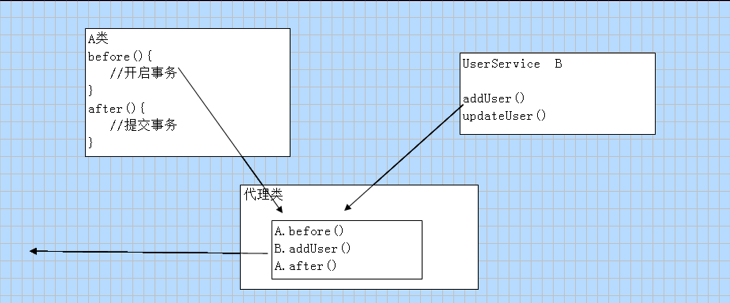
在调用某些类的方法时,要在方法执行前或后进行预处理或后处理;预处理或后处理的操作被封装在另一个类中。如图中,UserService类在执行addUser()或updateUser方法前开启事务,执行完后要提交事务;而几乎所有数据库操作都是如此,那么就可以将事务操作的方法提取出封装到一个类里。然后再利用代理类进行处理(目标类方法增强),返回代理类对象
二、AOP相关术语
Target:目标类,需要被增强的类。
JoinPoint:连接点,目标类上需要被增强的方法。(这些方法可以被增强,也可能不增强)。
PointCut:切入点,被增强的连接点(已经增强了)。切入点术语特殊的连接点
Advice:增强/通知,增强的方法。
weaving:织入,将切入点和通知结合,生成代理类过程。
Proxy:代理类。
Aspect:切面,切入点和通知结合形成的面
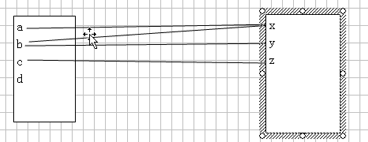
三、JDK动态代理模拟AOP
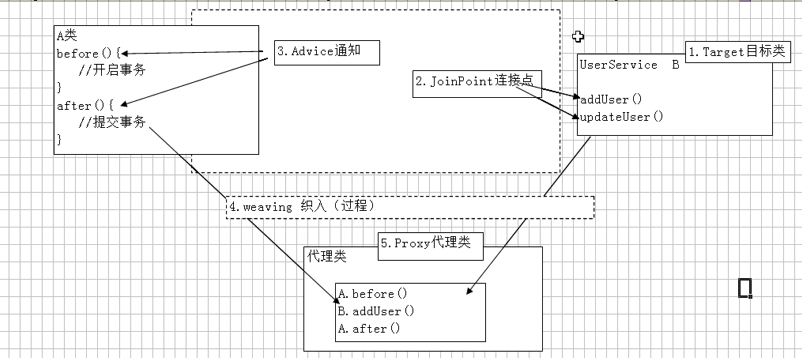
1、项目结构(接口+目标类+切面类+代理类+测试类)
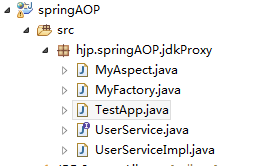
2、新建接口UserService

package hjp.springAOP.jdkProxy; public interface UserService { void addUser(); void updateUser(); }
3、新建目标类UserServiceImpl,并实现接口UserService

package hjp.springAOP.jdkProxy; public class UserServiceImpl implements UserService { @Override public void addUser() { // TODO Auto-generated method stub System.out.println("jdk add user"); } @Override public void updateUser() { // TODO Auto-generated method stub System.out.println("jdk update user"); } }
4、新建切面类MyAspect

package hjp.springAOP.jdkProxy; /** * 切面类,用于存放增强 * * @author JiaPeng * */ public class MyAspect { public void beafore() { System.out.println("before"); } public void after() { System.out.println("after"); } }
5、新建代理类MyFactory

package hjp.springAOP.jdkProxy; import java.lang.reflect.InvocationHandler; import java.lang.reflect.Method; import java.lang.reflect.Proxy; /** * 工厂生成代理类,目的:将目标类(切入点)和切面类(通知)结合。 * * @author JiaPeng * */ public class MyFactory { public static UserService createService() { // 创建目标类 final UserService userService = new UserServiceImpl(); // 创建切面类 final MyAspect myAspect = new MyAspect(); // 使用jdk动态代理,生成代理类 // 第一个参数是,当前类下的类加载器,第二个参数是目标类所继承的接口数组,第三个参数是匿名内部类 // 匿名内部类也就是没有名字的内部类;正因为没有名字,所以匿名内部类只能使用一次,它通常用来简化代码编写;但使用匿名内部类还有个前提条件:必须继承一个父类或实现一个接口 UserService proxyService = (UserService) Proxy.newProxyInstance(MyFactory.class.getClassLoader(), userService.getClass().getInterfaces(), new InvocationHandler() { // 代理类每一个方法执行时,都将调用处理类的invoke方法 @Override public Object invoke(Object proxy, Method method, Object[] args) throws Throwable { // TODO Auto-generated method stub // 执行前通知 myAspect.beafore(); // 执行目标类的相应方法 Object obj = method.invoke(userService, args); // 执行后通知 myAspect.after(); return obj; } }); return proxyService; } }
6、新建测试类

package hjp.springAOP.jdkProxy; import org.junit.Test; public class TestApp { @Test public void demo1() { UserService userService = MyFactory.createService(); userService.addUser(); userService.updateUser(); } }
四、CGLIB模拟AOP
cglib 字节码增强工具,一般框架都使用。只要有类就可以增强
1、项目结构(cglib的jar包已被spring打包好了,所以添加了spring的主要jar包就可以了)
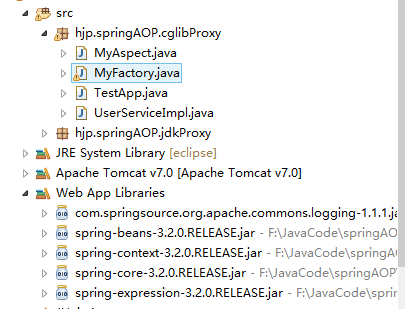
2、新建目标类UserServiceImpl,没有接口

package hjp.springAOP.cglibProxy; public class UserServiceImpl { public void addUser() { System.out.println("cglib add user"); } public void updateUser() { System.out.println("cglib update user"); } }
3、新建切面类

package hjp.springAOP.cglibProxy; /** * 切面类,用于存放增强 * * @author JiaPeng * */ public class MyAspect { public void beafore() { System.out.println("before"); } public void after() { System.out.println("after"); } }
4、新建代理类

package hjp.springAOP.cglibProxy; import java.lang.reflect.InvocationHandler; import java.lang.reflect.Method; import java.lang.reflect.Proxy; import org.eclipse.jdt.internal.compiler.classfmt.FieldInfoWithAnnotation; import org.springframework.cglib.proxy.Enhancer; import org.springframework.cglib.proxy.MethodInterceptor; import org.springframework.cglib.proxy.MethodProxy; /** * 工厂生成代理类,目的:将目标类(切入点)和切面类(通知)结合。 * * @author JiaPeng * */ public class MyFactory { public static UserServiceImpl createService() { // 创建目标类 final UserServiceImpl userServiceImpl = new UserServiceImpl(); // 创建切面类 final MyAspect myAspect = new MyAspect(); // 使用cglib创建代理类,其实现方式就是在cglib运行时,动态创建目标类子类(该子类就是代理类,Java动态代理是基于接口或父类的) // 创建核心类 Enhancer enhancer = new Enhancer(); // 设置父类 enhancer.setSuperclass(userServiceImpl.getClass()); // 代理类方法将调用回调函数,等效JDK InvocationHandler // 接口Callback,子接口MethodInterceptor对方法进行增强 enhancer.setCallback(new MethodInterceptor() { @Override // 前三个参数与jdk动态代理invoke相同 // 第四个参数是方法代理 public Object intercept(Object proxy, Method method, Object[] args, MethodProxy methodProxy) throws Throwable { // TODO Auto-generated method stub // 切面类的前通知 myAspect.beafore(); // 目标方法 //Object object = method.invoke(userServiceImpl, args); Object object = methodProxy.invokeSuper(proxy, args);//执行代理类(子类)父类方法(父类就是目标类),效果和上面的一样 // 切面类后通知 myAspect.after(); return object; } }); // 创建代理类 return (UserServiceImpl) enhancer.create(); } }
5、新建测试类

package hjp.springAOP.cglibProxy; import org.junit.Test; public class TestApp { @Test public void demo1() { UserServiceImpl userService = MyFactory.createService(); userService.addUser(); userService.updateUser(); } }
五、利用spring工厂bean,半自动化模拟AOP
使用spring提供FactoryBean创建代理对象,手动的获取代理对象。生成代理需要应用增强(通知),通知需要确定方法名称。spring规范规定通知类型从而确定方法名称。
AOP联盟五种通知类型,spring对AOP联盟进行支持。
前置通知:org.springframework.aop.MethodBeforeAdvice 在目标方法执行前实施增强
后置通知:org.springframework.aop.AfterReturningAdvice 在目标方法执行后实施增强
环绕通知:org.aopalliance.intercept.MethodInterceptor 在目标方法执行前后实施增强
异常抛出通知:org.springframework.aop.ThrowsAdvice 在方法抛出异常后实施增强
引介通知:org.springframework.aop.Introductioninterceptor 在目标类中添加一些新的方法和属性
环绕通知可以模拟其他通知类型,如:
try{
前置
//必须手动执行目标方法
后置
}catch{
//异常抛出
}
1、项目结构:(新加AOP联盟的jar包和spring对AOP依赖的jar包)
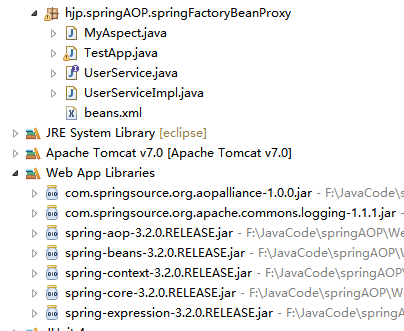
2、接口UserService及其实现类UserServiceImpl同上面一样
3、切面类MyAspect不一样了,需要继承接口MethodInterceptor并实现其方法,代码如下:

package hjp.springAOP.springFactoryBeanProxy; import org.aopalliance.intercept.MethodInterceptor; import org.aopalliance.intercept.MethodInvocation; /** * 切面类,用于存放通知(增强),使用的AOP联盟规范,必须实现接口,从而确定方法名称(即,spring如何执行通知) * * @author JiaPeng * */ public class MyAspect implements MethodInterceptor { @Override public Object invoke(MethodInvocation methodInvocation) throws Throwable { // TODO Auto-generated method stub System.out.println("前"); //环绕通知,必须手动的执行目标方法 Object obj=methodInvocation.proceed(); System.out.println("后"); return obj; } }
4、测试类代码如下:

package hjp.springAOP.springFactoryBeanProxy; import org.junit.Test; import org.springframework.context.ApplicationContext; import org.springframework.context.support.ClassPathXmlApplicationContext; public class TestApp { @Test public void demo1() { String xmlPath="hjp/springAOP/springFactoryBeanProxy/beans.xml"; ApplicationContext applicationContext=new ClassPathXmlApplicationContext(xmlPath); UserService userService = (UserService)applicationContext.getBean("proxyServiceId"); userService.addUser(); userService.updateUser(); } }
5、新建beans.xml配置文件,里面有注解,不再赘述,注意配置中可以设置是否使用cglib代理

<?xml version="1.0" encoding="UTF-8"?> <beans xmlns="http://www.springframework.org/schema/beans" xmlns:xsi="http://www.w3.org/2001/XMLSchema-instance" xsi:schemaLocation="http://www.springframework.org/schema/beans http://www.springframework.org/schema/beans/spring-beans.xsd"> <!-- 1、创建目标类 --> <bean id="userServiceId" class="hjp.springAOP.springFactoryBeanProxy.UserServiceImpl"></bean> <!-- 2、创建切面类 (通知) --> <bean id="myAspectId" class="hjp.springAOP.springFactoryBeanProxy.MyAspect"></bean> <!-- 3、生成代理,将目标类与切面类结合 ProxyFactoryBean:生成一个特殊代理Bean --> <bean id="proxyServiceId" class="org.springframework.aop.framework.ProxyFactoryBean"> <!-- 确定接口 --> <property name="interfaces" value="hjp.springAOP.springFactoryBeanProxy.UserService"></property> <!-- 确定目标类 --> <property name="target" ref="userServiceId"></property> <!-- 确定通知,使用切面类名称 --> <property name="interceptorNames" value="myAspectId"></property> <!-- 强制使用cglib代理,如果不使用cglib可以不写,默认为false --> <property name="optimize" value="true"></property> </bean> </beans>
六、传统springAOP
1、项目结构(较上面中的引用,新增了aspectj的jar包)
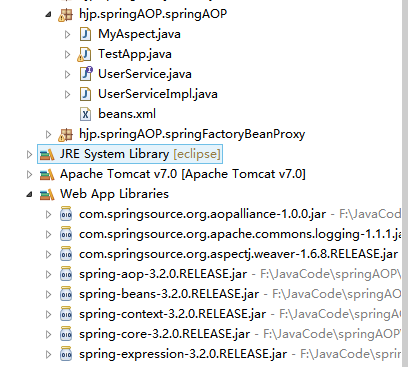
2、接口UserService及其实现类UserServiceImpl如上,MyAspect切面类也是如上实现接口MethodInterceptor
3、beans.xml配置文件,注意要加xsd引用(命名空间xmlns:aop="http://www.springframework.org/schema/aop;引用地址:http://www.springframework.org/schema/aop http://www.springframework.org/schema/aop/spring-aop.xsd)

<?xml version="1.0" encoding="UTF-8"?> <beans xmlns="http://www.springframework.org/schema/beans" xmlns:xsi="http://www.w3.org/2001/XMLSchema-instance" xmlns:aop="http://www.springframework.org/schema/aop" xsi:schemaLocation="http://www.springframework.org/schema/beans http://www.springframework.org/schema/beans/spring-beans.xsd http://www.springframework.org/schema/aop http://www.springframework.org/schema/aop/spring-aop.xsd"> <!-- 1、创建目标类 --> <bean id="userServiceId" class="hjp.springAOP.springAOP.UserServiceImpl"></bean> <!-- 2、创建切面类 (通知) --> <bean id="myAspectId" class="hjp.springAOP.springAOP.MyAspect"></bean> <!-- spring 传统AOP开发,使通知引用到目标类切入点上 --> <aop:config> <!-- pointcut用于声明切入点,确定目标类上哪些方法将被增强 expression用于编写切入点表达式,(aspectj 切入点表达式) 固定格式:execution(* hjp.springAOP.springAOP.*.*(..)) 第一个* 表示返回值类型,接着是包名称,第二个* 是类名,第三个是方法名,后面括号内点点是参数列表 --> <aop:pointcut expression="execution(* hjp.springAOP.springAOP.*.*(..))" id="myPointCut" /> <!-- advice-ref:通知引用;pointcut-ref:切入点引用 --> <aop:advisor advice-ref="myAspectId" pointcut-ref="myPointCut" /> </aop:config> </beans>
4、测试类代码:

package hjp.springAOP.springAOP; import org.junit.Test; import org.springframework.context.ApplicationContext; import org.springframework.context.support.ClassPathXmlApplicationContext; public class TestApp { @Test public void demo1() { String xmlPath="hjp/springAOP/springAOP/beans.xml"; ApplicationContext applicationContext=new ClassPathXmlApplicationContext(xmlPath); UserService userService = (UserService)applicationContext.getBean("userServiceId"); userService.addUser(); userService.updateUser(); } }
